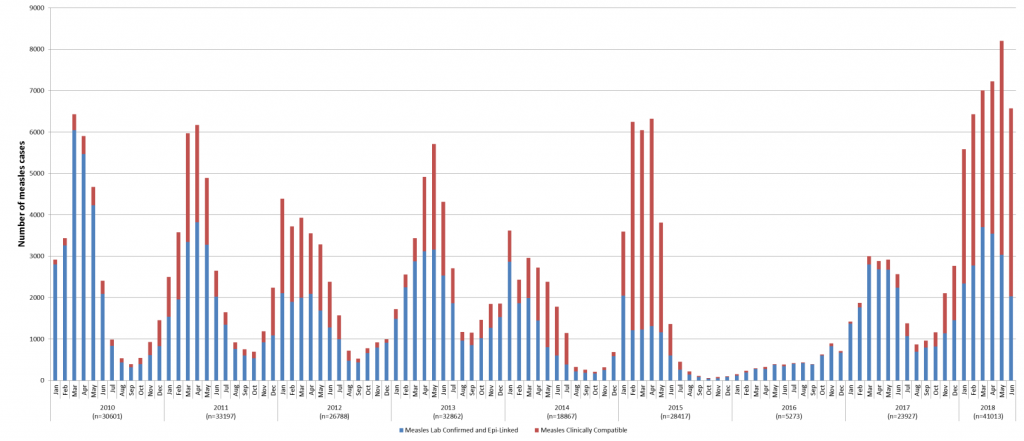Last Updated on: 22nd November 2023, 04:35 pm
Measles outbreak at decade high according to WHO
Over 41 000 children and adults in the European Region have been infected with measles in the first six months of 2018. The total number for this period far exceeds the 12-month totals reported for every year this decade. So far, the highest annual total for measles cases between 2010 and 2017 was 23 927 for 2017 and the lowest was 5273 for 2016. Monthly country reports also indicate that at least 37 people have died due to measles so far this year.
“Following the decade’s lowest number of cases in 2016, we are seeing a dramatic increase in infections and extended outbreaks.” says Dr Zsuzsanna Jakab, WHO Regional Director for Europe. “We call on all countries to immediately implement broad, context-appropriate measures to stop further spread of this disease. Good health for all starts with immunization, and as long as this disease is not eliminated we are failing to live up to our Sustainable Development Goal commitments.”
Seven countries in the Region have seen over 1000 infections in children and adults this year (France, Georgia, Greece, Italy, Russian Federation, Serbia and Ukraine). Ukraine has been the hardest hit with over 23 000 people affected, accounting for over the half the regional total. Measles-related deaths have been reported in all of these countries, with Serbia reporting the highest number of 14.
Uneven progress towards measles and rubella elimination
According to the latest assessment by the European Regional Verification Commission for Measles and Rubella Elimination (RVC) released today, 43 of the Region’s 53 Member States have interrupted the endemic spread of measles and 42 have interrupted rubella (based on 2017 reporting).
At the same time, the Commission expressed concerns about the quality of disease surveillance and low immunization coverage in some countries. It also concluded that chains of measles transmission continued for more than 12 months in some countries that were no longer endemic for the disease, reverting the country’s status back to endemic.
“This partial setback demonstrates that every under-immunized person remains vulnerable no matter where they live and every country must keep pushing to increase coverage and close immunity gaps, even after achieving interrupted or eliminated status,” says Dr Nedret Emiroglu, Director of the Division of Health Emergencies and Communicable Diseases.
Measles can be stopped
The measles virus is exceptionally contagious and spreads easily among susceptible individuals. To prevent outbreaks, at least 95% immunization coverage with two doses of measles-containing vaccine is needed every year in every community, as well as efforts to reach children, adolescents and adults who missed routine vaccination in the past.
While immunization coverage with two doses of measles-containing vaccine increased from 88% of eligible children in the Region in 2016 to 90% in 2017, large disparities at local level persist, with some communities reporting over 95% coverage and others below 70%.
WHO is working closely with Member States currently facing outbreaks to implement response measures, including enhanced routine and supplemental immunization as well as heightened surveillance to quickly detect cases, as well as with other countries to attain the 95% threshold.
“At this midterm juncture for the European Vaccine Action Plan, we must celebrate our achievements while not losing sight of those who are still vulnerable and whose protection requires our urgent and ongoing attention,” concludes Dr Jakab. “We can stop this deadly disease. But we will not succeed unless everyone plays their part: to immunize their children, themselves, their patients, their populations – and also to remind others that vaccination saves lives”.
All 53 countries in the European Region will review mid-term progress of the European Vaccine Action Plan at the 68thWHO Regional Committee for Europe taking place in Rome, Italy on 17-20 September 2018.
WHO EpiData: Monthly reports of measles and rubella surveillance data for the European Region: http://www.euro.who.int/en/health-topics/disease-prevention/vaccines-and-immunization/publications/surveillance-and-data/who-epidata
WHO Regional Office for Europe Centralized Information System for Infectious Diseases (CISID): http://data.euro.who.int/cisid
7th report of the European Regional Verification Commission for Measles and Rubella Elimination: http://www.euro.who.int/en/health-topics/communicable-diseases/measles-and-rubella/publications/2018/7th-meeting-of-the-european-regional-verification-commission-for-measles-and-rubella-elimination-rvc.-report
URL pending
Measles key facts: http://www.who.int/news-room/fact-sheets/detail/measles









